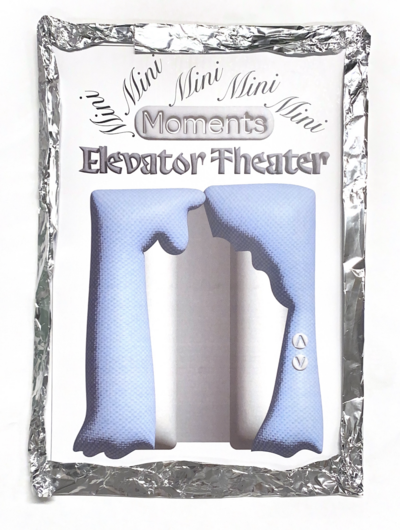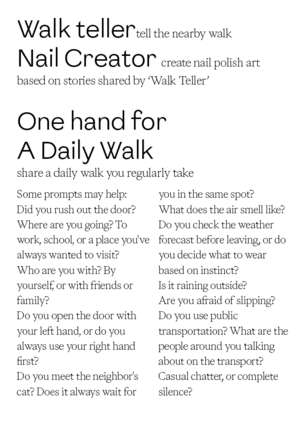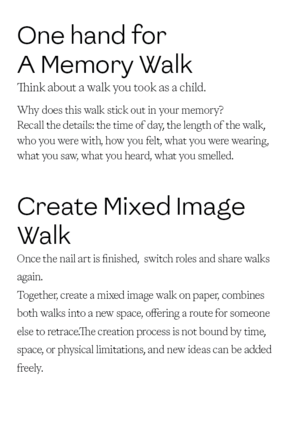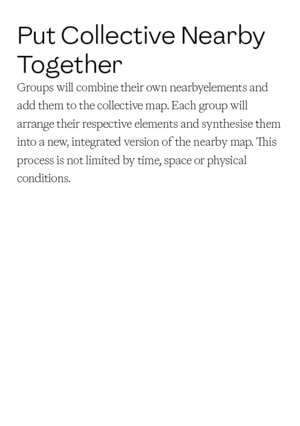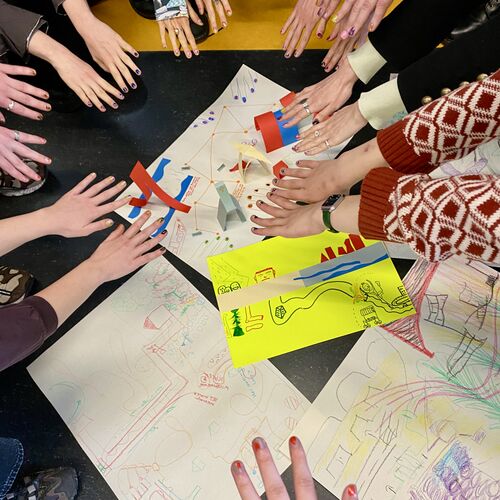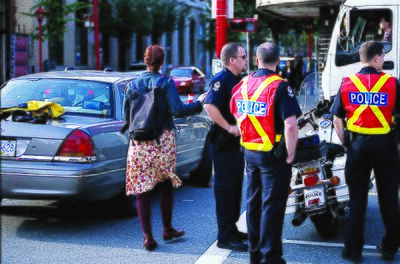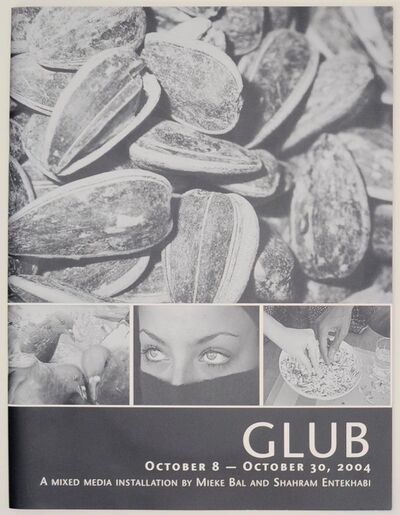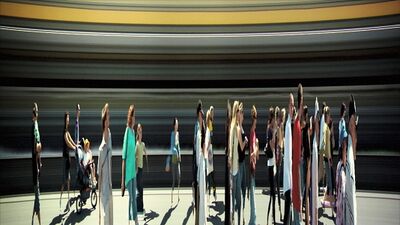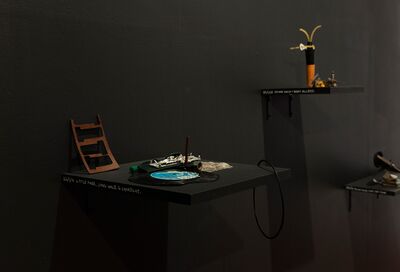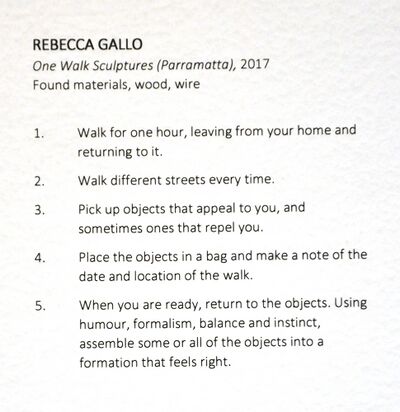User:ZUZU/Project proposal: Difference between revisions
| (3 intermediate revisions by the same user not shown) | |||
| Line 40: | Line 40: | ||
[[File:Nail salon manual-03.png|frameless|upright=0.5|300px]] | [[File:Nail salon manual-03.png|frameless|upright=0.5|300px]] | ||
[[File:Nail salon manual-04.png|frameless|upright=0.5|300px]] | [[File:Nail salon manual-04.png|frameless|upright=0.5|300px]] | ||
[[File:Nail salon.jpg|frameless| | [[File:Nail salon.jpg|frameless|center|500px]] | ||
<div style="text-align: center;"> | |||
<img src="https://pzwiki.wdka.nl/mw-mediadesign/images/d/d7/Collective_nail.gif?20241122234823" width="400px"> | |||
</div> | |||
{| width=600px align=center | {| width=600px align=center | ||
|<pre style="background:white; color:grey; font-family:courier; font-size:12px;"> | |<pre style="background:white; color:grey; font-family:courier; font-size:12px;"> | ||
| Line 175: | Line 173: | ||
[https://www.researchgate.net/publication/355953022_The_Nearby_A_Scope_of_Seeing The Nearby: A Scope of Seeing] by Xiang Biao<br> | [https://www.researchgate.net/publication/355953022_The_Nearby_A_Scope_of_Seeing The Nearby: A Scope of Seeing] by Xiang Biao<br> | ||
[https://monoskop.org/images/c/c4/Mauss_Marcel_1935_1973_Techniques_of_the_Body.pdf Techniques of the body ]by Marcel Mauss<br> | [https://monoskop.org/images/c/c4/Mauss_Marcel_1935_1973_Techniques_of_the_Body.pdf Techniques of the body ]by Marcel Mauss<br> | ||
[https://monoskop.org/images/1/19/Goffman_Erving_The_Presentation_of_Self_in_Everyday_Life.pdf The Presentation of Self in Everyday Life]by [https://en.wikipedia.org/wiki/Erving_Goffman Erving Goffman] | [https://monoskop.org/images/1/19/Goffman_Erving_The_Presentation_of_Self_in_Everyday_Life.pdf The Presentation of Self in Everyday Life]by [https://en.wikipedia.org/wiki/Erving_Goffman Erving Goffman]<br> | ||
[https://www.konstfack.se/PageFiles/17986/Leung_Squatting-Through-Violence.pdf Squatting through Violence ]by Simon Leung.<br> | [https://www.konstfack.se/PageFiles/17986/Leung_Squatting-Through-Violence.pdf Squatting through Violence ]by Simon Leung.<br> | ||
[The Hidden Dimension ]by Edward T. Hall<br> | [https://kulturiskvlevebi.weebly.com/uploads/1/8/3/7/18376403/hidden_dimension_1.pdf The Hidden Dimension]by Edward T. Hall<br> | ||
Latest revision as of 00:53, 23 November 2024
𖡼𖤣𖥧𖡼𓋼𖤣𖥧𓋼𓍊𝙿𝚛𝚘𝚓𝚎𝚌𝚝 𝚙𝚛𝚘𝚙𝚘𝚜𝚊𝚕 ☄. *. ⋆
𝚆𝚑𝚊𝚝 𝚍𝚘 𝚢𝚘𝚞 𝚠𝚊𝚗𝚝 𝚝𝚘 𝚖𝚊𝚔𝚎?
a series of workshops /self-life protocol /role-play games focus on how the intricacies of daily existence and digital communities shape the lives of me and my female (internet)neighbours in the Netherlands
𝙷𝚘𝚠 𝚍𝚘 𝚢𝚘𝚞 𝚙𝚕𝚊𝚗 𝚝𝚘 𝚖𝚊𝚔𝚎 𝚒𝚝?
𝚆𝚘𝚛𝚔𝚜𝚑𝚘𝚙𝚜
Focuses on uncovering hidden rituals; participants share micro-stories of their lives or present daily performances in an alienated space
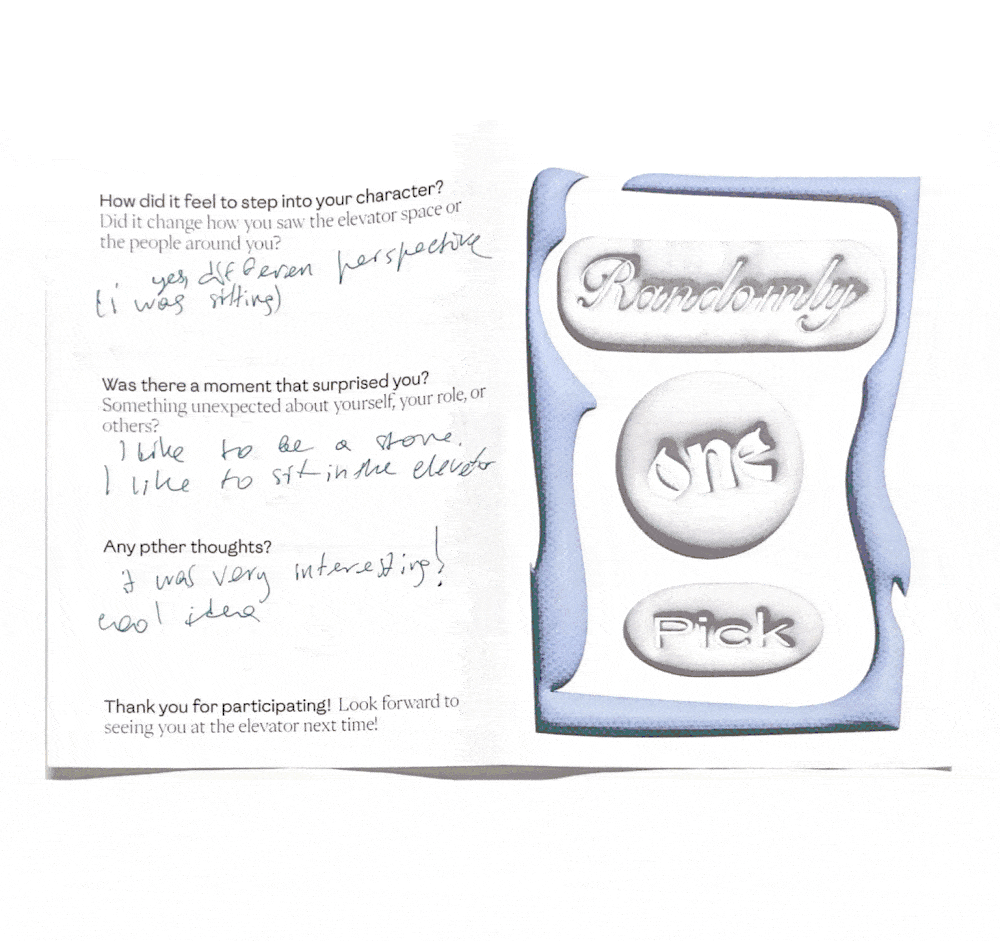
Mini Moment: Elevator Theater is an interactive exploration of how we inhabit shared spaces and express ourselves through body language and behavior. This project invites participants to reflect on their own experiences in the elevator, a small but intimate environment that often brings out different aspects of our personalities. |

Taking ‘Cantina’ as a space, I transformed it into a nail salon, here many of the nail technicians are Asian women who give the space a unique energy in their daily labour. By applying nail polish, sharing daily stories, and creating a mixed walk map, I invite participants to experience the ‘ nearby’ feeling and to express their personal and collective experiences of the ‘ nearby’ in this alienated space. |
𝚂𝚎𝚕𝚏-𝚕𝚒𝚏𝚎 𝚙𝚛𝚘𝚝𝚘𝚌𝚘𝚕
Based on the insights gained from thesis and workshops, I will continue to implement small, self-designed life protocols, experimenting with and documenting subtle changes in my everyday routines.
𝙴𝚕𝚎𝚟𝚊𝚝𝚘𝚛 𝚂𝚞𝚗𝚏𝚕𝚘𝚠𝚎𝚛 𝙿𝚛𝚘𝚝𝚘𝚌𝚘𝚕
Each time I step into an elevator, I will smile at everyone—a simple yet often overlooked gesture. This is an experiment to observe how such a small action can transform the atmosphere in a confined, shared space. I will carefully document people’s reactions as I carry out this practice.
The aim is to explore proximity—what happens when we intentionally allow ourselves to be seen and acknowledge others during fleeting moments of shared presence. Elevators serve as a micro-theater of everyday life, and in this unscripted performance, I take on the role of the Sunflower.
𝚁𝚘𝚕𝚎-𝚙𝚕𝚊𝚢 𝚐𝚊𝚖𝚎
In a fictional country, an unintelligible language will be spoken, a dice-rolling mechanism will be used to randomly assign identities, and the challenges faced by players will vary according to their assigned identities. These challenges will integrate my thesis findings, including exploring the daily lives of my female ‘internet neighbours’ through personal interviews and data collection from Chinese social media.
𝚃𝚒𝚖𝚎𝚝𝚊𝚋𝚕𝚎
- September**
catch ideas and internet surfing SIGN SPREAD Zinefest 2024 Bubble walks: Floating poses in city
- October**
draft of the project proposal and thesis outline
- November**
Host Collective Nearby Salon The project proposal and thesis outline Start elevator sunflower protocol testing interaction-based protocols in elevators, documenting participant reactions Make my Chinese social media accounts look more like the ones used by real people to make it easier to find suitable interviewees
- December**
TRIM4 assessments Continue refining interview questions and gathering data Conduct Preliminary Interviews Draft initial ideas for a role-play game Brainstorm game mechanics, including self-life protocols and identity roles inspired by personal and interviewee narratives.
- January**
Expand Interview Pool Begin identifying recurring themes and categorizing findings. Design the initial framework for the role-play game
- February-March**
Ongoing Workshops and Testing
- April-May**
Think about the final way to present the project outcomes
- June**
Host Closing Nearby Event
𝚆𝚑𝚢 𝚍𝚘 𝚢𝚘𝚞 𝚠𝚊𝚗𝚝 𝚝𝚘 𝚖𝚊𝚔𝚎 𝚒𝚝?
The initial idea stemmed from a class discussion where I realised that the biggest topic for me at the moment is how to make it in the Netherlands. At first, I tried to explore issues related to visa anxiety, but gradually realised that focusing on visa policy could easily lead the perspective into a grand narrative framework and start a discussion of abstract terms, which was not the direction I wanted to delve into. I was more interested in how individuals live their lives behind these issues - or rather, how I (and people in various other situations) manage to live and cope in concrete situations.
Before leaving China, my sense of everyday life and “nearby” had, in some ways, already disappeared. This project feels like a response to my process of rebuilding the everyday and the “nearby” while living in the Netherlands.I aim to avoid engaging with overarching narratives or overly broad topics, focusing instead on the day-to-day details. Here, I find myself relying on the Chinese internet more than ever before. Part of this is due to language barriers limiting my information access. Conversely, Because of the nature of big data, I’ve found that my understanding of the daily lives of women in the Netherlands—who I’ve never met—may even surpass my understanding of the lives of those around me when I lived in China. By relying on shared content from social platforms, I’ve learned things like which supermarket products are beautifully packaged but overly sweet, where to look to spot the northern lights on certain days, which newly opened restaurant is delicious but has poor service, or which hiking trail in a specific national park offers a chance to encounter friendly wild horses. Other tips include how a “sunlight lamp” can improve your mood during continuous rain, or which hairdresser truly understands and delivers on specific haircut requests.
These women—whom I’ve never met and likely never will—are like my “internet neighbors.” While we’ve never spoken directly, I rely heavily on their advice to navigate my life here. This observation reminds me of the anthropologist Xiangbiao's suggestion that 附近‘the nearby’ is a fluid concept, not tied to any fixed space. As people move, their “nearby” also shifts, formed by emotional and spatial connections with the people and space around them. The everyday details of one person’s nearby might become a brand-new story for another. In these details, I try to focus on language, body, space, and their intertwining in the daily life.
𝚆𝚑𝚘 𝚌𝚊𝚗 𝚑𝚎𝚕𝚙 𝚢𝚘𝚞 𝚊𝚗𝚍 𝚑𝚘𝚠?
My Female Internet Neighbours - Their presence is a help
Michael Murtaugh-Inspiring advice and feedback
Manetta Berends, Joseph Knierzinger Assistance with designing workshops and integrating digital tools
Steve Rushton-Guidance on structuring the thesis.
Yangliu-Visual feedback and reference for the aesthetic aspects.
Wang Ziheng-Help with sound for role-play games.
𝚁𝚎𝚕𝚊𝚝𝚒𝚘𝚗 𝚝𝚘 𝚙𝚛𝚎𝚟𝚒𝚘𝚞𝚜 𝚙𝚛𝚊𝚌𝚝𝚒𝚌𝚎
- Emohoohoo explored how emotional shifts reshape public space
- Poses to explore the city playful urban wandering
- Mini moment: Elevator Theater everyday spaces became sites of micro-performances
- Nearby Nail Salon a workshop for intimate and collective storytelling
𝚁𝚎𝚕𝚊𝚝𝚒𝚘𝚗 𝚝𝚘 𝚊 𝚕𝚊𝚛𝚐𝚎𝚛 𝚌𝚘𝚗𝚝𝚎𝚡𝚝
I hope this project is both deeply personal and universally relatable. A common criticism on the Chinese internet is that people "don't care about specific individuals" and become collectively obsessed with grand narratives. These grand narratives often attempt to instil a sense of national identity in the masses, and these grand narratives undermine or weaken closeness and concrete, meaningful action in the immediate, everyday context.
Initially, I focused on exploring the survival strategies of non-EU women in Europe, but I gradually narrowed the scope to Chinese women. However, even this classification felt awkward—attaching nationality as a category to "women" created discomfort, as it seemed to politicize identity in ways I sought to avoid. Eventually, I shifted my attention to the specific group of "my female internet neighbours," attempting to decouple gendered identities from their political labels, such as nationality.
This approach aligns with feminist practices that emphasize women’s autonomy beyond the confines of national borders. As Virginia Woolf wrote, "As a woman, I have no country. As a woman, I want no country. As a woman, my country is the whole world." My aim is to focus on the soft, intimate realities of individuals—their bodies, emotions, and connections—rather than framing them within political or nationalist narratives.
In essence, this project is a response to the erosion of immediate, everyday connections, reclaiming the importance of the specific and the personal. It aims to see and understand individuals as they are, unburdened by the weight of political or collective identities, and instead defined by their lived experiences and shared acts of living.
𝚁𝚎𝚏𝚎𝚛𝚎𝚗𝚌𝚎𝚜
𝚜𝚘𝚖𝚎 𝚙𝚛𝚘𝚓𝚎𝚌𝚝𝚜 𝚝𝚑𝚊𝚝 𝚒𝚗𝚜𝚙𝚒𝚛𝚒𝚗𝚐
Touching 1000 People by Diane Borsato. For a month, the artist went out of her way to gently push, rub and tap 1000 strangers in the city. The exercise was like a minimalist performance to explore the smallest possible gesture, and how it could create an effect in public. |
Glub by Mieke Bal and Shahram Entekhabi Through simple actions like hand gestures and mouth movements, and the discarded seed shells, the act transforms the street environment |
On Perspective and Motion by Glub by Daniel Crook "I Love walking, particularly as a flaneur getting Lost in the back streets of foreign cities. I also spend a Lot of time watching and filming people walking in cities. It might have something to do with my training as an animator analysing people’s ‘walk cycles’. There is something about the speed of walking; that rate of movement with a particularly human scale – not too fast, not too slow – the Goldilocks point for objects moving through a frame. And walking is not only a Linear movement through space, it also contains the internal pendulum cycles of swinging arms and Legs, the sine wave bobbing of the head, the Last-second infinitesimal raise of the toes." |
One Walk Sculptures by Rebecca Gallo A series of found object assemblages, each comprising objects collected during a single walk departing from and returning to home. |
𝙱𝚘𝚘𝚔𝚜 𝚊𝚗𝚍 𝙾𝚝𝚑𝚎𝚛
The Nearby: A Scope of Seeing by Xiang Biao
Techniques of the body by Marcel Mauss
The Presentation of Self in Everyday Lifeby Erving Goffman
Squatting through Violence by Simon Leung.
The Hidden Dimensionby Edward T. Hall

